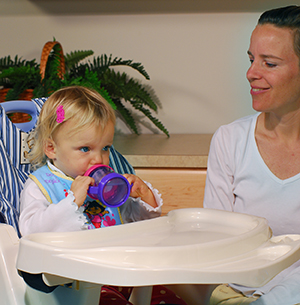When Your Child Has Diarrhea
When Your Child Has Diarrhea

What causes diarrhea?
Diarrhea may be caused by:
Bacterial, viral, or parasitic infections (such as Salmonella, rotavirus, or Giardia)
Food intolerances (such as dairy products)
Medicines (such as antibiotics)
Intestinal illness (such as Crohn’s disease)
What are common symptoms of diarrhea?
Common symptoms of diarrhea may include:
Looser, more watery stools than normal
More frequent stools than normal
More urgent need to pass stool than normal
Pain or spasms of the digestive tract
How is diarrhea diagnosed?
The healthcare provider examines your child. You’ll be asked about your child’s symptoms, health, and daily routine. The healthcare provider may also order lab tests, such as stool studies or blood tests. These tests can help detect problems that may be causing your child’s diarrhea.
How is diarrhea treated?
Your child's healthcare provider can talk with you about treatment options. These may include:
Preventing dehydration by giving your child plenty of fluids (such as water). Infants may also be given a children’s electrolyte solution. Limit fruit juice or soda, which has a lot of sugar, as do commercially available sports drinks.
Giving your child prescribed medicine to treat the cause of the diarrhea. Do not give your child antidiarrheal medicines unless told to by your child’s healthcare provider.
Eating starchy foods such as cereal, crackers, or rice.
Removing certain foods from your child’s diet if they are causing the diarrhea. Your child may need to avoid dairy products and foods high in fat or sugar until the diarrhea has passed. However, most children can eat a regular diet, which will actually help them recover more quickly.
Infants can usually continue to breastfeed
When to call your child's healthcare provider
Call the healthcare provider if your otherwise healthy child:
Has diarrhea that lasts longer than 3 days.
Has a fever (see Fever and children, below)
Is unable to keep down any food or water.
Shows signs of dehydration (very dark or little urine, no tears when crying, dry mouth, or dizziness).
Has blood or pus in the stool, or black, tarry stool.
Looks or acts very sick.
Fever and children
Always use a digital thermometer to check your child’s temperature. Never use a mercury thermometer.
For infants and toddlers, be sure to use a rectal thermometer correctly. A rectal thermometer may accidentally poke a hole in (perforate) the rectum. It may also pass on germs from the stool. Always follow the product maker’s directions for proper use. If you don’t feel comfortable taking a rectal temperature, use another method. When you talk to your child’s healthcare provider, tell him or her which method you used to take your child’s temperature.
Here are guidelines for fever temperature. Ear temperatures aren’t accurate before 6 months of age. Don’t take an oral temperature until your child is at least 4 years old.
Infant under 3 months old:
Ask your child’s healthcare provider how you should take the temperature.
Rectal or forehead (temporal artery) temperature of 100.4°F (38°C) or higher, or as directed by the provider
Armpit temperature of 99°F (37.2°C) or higher, or as directed by the provider
Child age 3 to 36 months:
Rectal, forehead (temporal artery), or ear temperature of 102°F (38.9°C) or higher, or as directed by the provider
Armpit temperature of 101°F (38.3°C) or higher, or as directed by the provider
Child of any age:
Repeated temperature of 104°F (40°C) or higher, or as directed by the provider
Fever that lasts more than 24 hours in a child under 2 years old. Or a fever that lasts for 3 days in a child 2 years or older.
Updated:
April 04, 2018
Sources:
Evaluation of diarrhea in children. UpToDate.
Reviewed By:
Freeborn, Donna, PhD, CNM, FNP,Lehrer, Jenifer, MD,Turley, Ray, BSN, MSN